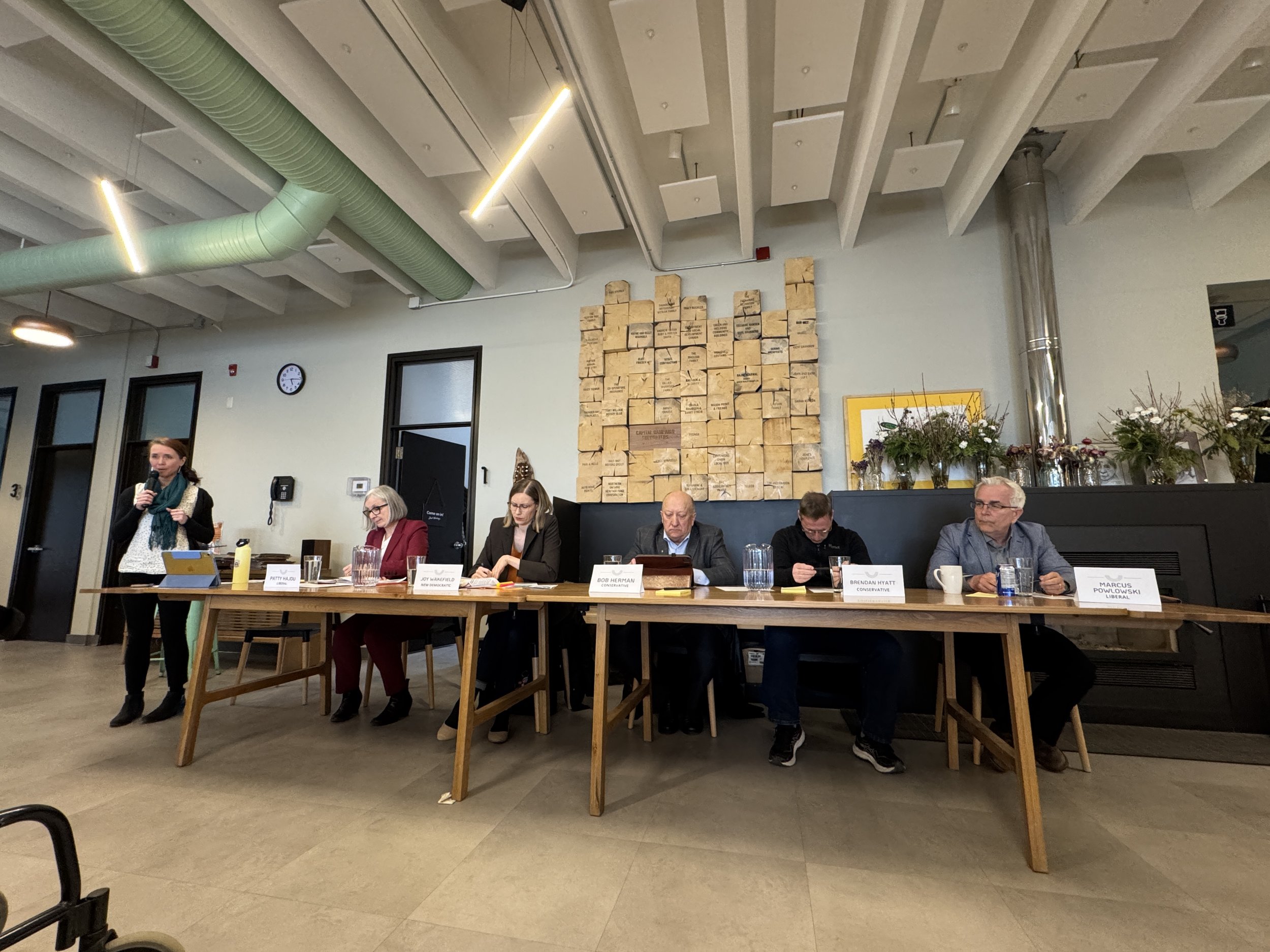2025 campaign at a glance
Community Food Centers of Canada, Bow Valley Food Alliance, and the Bow Valley Immigration Partnership held an Eat Think Vote event at the Canmore Public Library on April 23, 2025.
Watch the live debate from Grand Potager’s Eat Think Vote event in LaSalle–Émard–Verdun on April 10, 2025. Local candidates face off on the issues that matter most to our community.
The Hudson Food Collective held their Eat Think Vote event on April 15, 2025 at the Hudson Community Center
Thunder Bay + Area Food Strategy and Roots Community Food Centre held their ETV event at the Roots Community Food Centre where they asked candidates about food insecurity, local food systems, Indigenous Food Sovereignty.
Did you know about the food crisis in Canada?
Canada is facing a food crisis that requires immediate action. The facts are alarming:
1 in 4 Canadian households are food insecure, meaning they worry about or cannot afford enough food.
40% of Black and Indigenous households are food insecure, highlighting systemic oppression and deep inequities in our food systems.
2 in 3 food insecure households have employment but still can't afford enough food, highlighting that this crisis affects working families.
Grocery prices are the #1 economic concern for Canadians, showing that voters care deeply about this issue already
Just 5 companies control over 80% of Canada's food retail market, limiting options and competition.
Grocery prices have increased 20% from 2020 to 2023, making food increasingly unaffordable.
*Sources below
What is Food Sovereignty?
Food sovereignty is when communities are free to shape their own food systems that are culturally appropriate, work with nature, and ensure fair livelihoods. Local and diverse food sources ensure resilience to shocks like flooding and trade wars while reducing vulnerability to corporate consolidation.
There is no food sovereignty without Indigenous food sovereignty. That's why we must honor and empower the first stewards of the land and water, and support them to reclaim food sovereignty in their community.
The Eat Think Vote Campaign
Eat Think Vote brings people together to talk about food issues during federal elections. Our approach is simple but powerful:
Local organizations or individuals host events in their electoral districts
Federal candidates are invited to participate & engage with voters
Community members share their concerns and ideas directly with candidates
These conversations put food issues on the table in the federal election
Our Impact
Launched in 2015, we've run Eat Think Vote in four electoral campaigns, changing how Canadian politicians talk about food:
300+ organizations mobilized nationwide to host events
11,000+ Canadians engaged in meaningful conversations about food policy
380+ federal candidates participated in community discussions
78 candidates who participated in Eat Think Vote were then elected to Parliament, bringing community conversations to the federal level
Achieved many policy victories, including Canada's first National Food Policy
Why This Matters Now
This is a critical moment for Canada's food future. We face three major challenges. Rising poverty leads to unprecedented food insecurity. Escalating food prices stretch household budgets. Growing trade tensions threaten our food supply. Our choices now will shape food systems for generations. That's why we need to keep pushing for a national conversation about food sovereignty.
Contact us
Interested in working together? Fill out some info and we will be in touch shortly. We can’t wait to hear from you!
*Sources:
PROOF, April 26, 2024. “New data on household food insecurity in 2023”. https://proof.utoronto.ca/2024/new-data-on-household-food-insecurity-in-2023/
Statistics Canada, 2023. “Food Price” Data Hub. https://www150.statcan.gc.ca/n1/en/subjects/agriculture_and_food/food/food_prices
Reevely, David. November 12, 2024. “Food prices top Canadians’ financial anxieties.” The Logic. https://thelogic.co/news/exclusive/canada-food-prices-abacus-poll/
Competition Bureau, June 27, 2023. “Canada needs more competition: Competition Bureau Grocery Market Competition Report.” Government of Canada. https://competition-bureau.canada.ca/en/how-we-foster-competition/education-and-outreach/canada-needs-more-grocery-competition
PROOF, 2023. “Who are most at risk of household food insecurity?” https://proof.utoronto.ca/food-insecurity/who-are-most-at-risk-of-household-food-insecurity/









